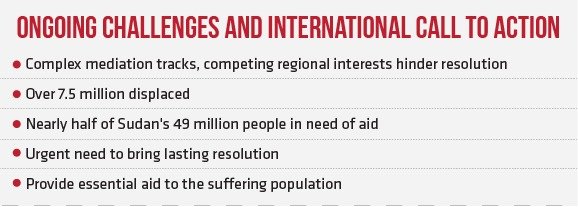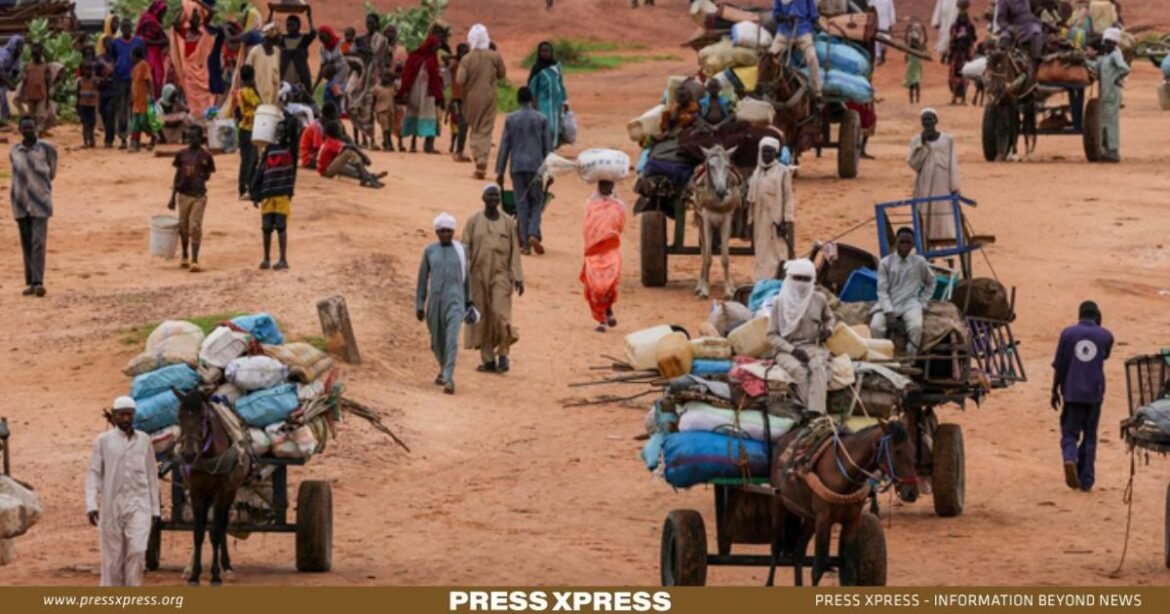Key Highlights
- Sudan’s conflicts spill into Chad, Central African Republic, and Libya
- RSF’s control extended with new firepower, impacting Darfur and other regions
- Paramilitary Rapid Support Forces (RSF) and allied Arab militias
- Negotiations for a military base in Port Sudan, impacting regional influence
- Official recognition of war crimes, crimes against humanity, and ethnic cleansing in Sudan
A recently uncovered United Nations report has unveiled the horrifying extent of ethnic violence in one city within Sudan’s West Darfur region. The report, seen by Reuters on Friday, discloses that between 10,000 and 15,000 people lost their lives in El Geneina last year (2023), victims of brutality perpetrated by the paramilitary Rapid Support Forces (RSF) and their allied Arab militias.
You can also read: NAM Condemns Israel’s ‘Cruel Genocidal Act’ in Gaza
The UN report, submitted to the UN Security Council by independent sanctions monitors, relies on intelligence sources to attribute the staggering death toll in El Geneina. This figure sharply contrasts with the UN’s overall estimate of 12,000 deaths across Sudan since the eruption of war on April 15, 2023, involving the Sudanese army and the RSF.

The report also highlights ‘credible’ accusations that the United Arab Emirates (UAE) played a role in supporting the RSF’s military efforts. According to the monitors, the UAE provided military support ‘several times per week’ via Amdjarass in northern Chad. In response, the UAE stated that it had conducted 122 flights delivering humanitarian aid to Amdjarass to assist Sudanese refugees fleeing the conflict.
Intense Violence and Ethnic Targeting
Between April and June of the preceding year (2023), El Geneina witnessed “intense violence” as the RSF and its allies targeted the ethnic African Masalit tribe. The monitors characterized these attacks as potentially constituting war crimes and crimes against humanity.
The RSF, however, has consistently denied these accusations, asserting that any of its soldiers found involved would face justice. The monitors, in their annual report to the UN Security Council, emphasized that the attacks in El Geneina were meticulously planned, coordinated, and executed by the RSF and their allied Arab militias.
Survivor accounts, as documented by Reuters and reiterated in the UN report, detail the gruesome scenes of ethnically targeted violence. People fleeing El Geneina faced harassment, robbery, physical assaults, and indiscriminate shootings by RSF and allied militias. The monitors reported widespread conflict-related sexual violence and summarily executed individuals based on their ethnicity, particularly targeting young men identified as Masalit.
New Firepower
The RSF’s takeover of most of Darfur was facilitated by support from Arab allied communities, complex financial networks, and new military supply lines through Chad, Libya, and South Sudan. The report highlighted the RSF’s acquisition of new firepower, leading to a significant impact on the balance of forces in Darfur and other regions of Sudan.
The UN missions for Chad, Libya, and South Sudan did not immediately respond to requests for comment. Despite international condemnation and accusations of war crimes and ethnic cleansing, the RSF has continued to make military gains, consolidating its control over regions such as Wad Madani. The United States officially declared war crimes in Sudan and crimes against humanity and ethnic cleansing committed by the RSF and allied militias in December.

The geopolitical complexity of Sudan
In their pursuit of power and authority, Sudan’s generals, known for their longstanding involvement in the local economy and facing allegations of corruption, have actively sought foreign partnerships. They have extended invitations to Gulf states to invest in the expansive agricultural potential found in the fertile soil along the Nile River.
Nevertheless, concerning gold, more questionable dealings have surfaced, particularly involving Russia’s Wagner group. The Wagner group stands accused of illicitly smuggling gold out of Sudan. Yevgeniy Prigozhin, the head of Wagner, has been targeted by the US Treasury for exploiting Sudan’s natural resources for personal gain and engaging in the dissemination of malign influence online through his “troll farm.”
Russia’s interests in Sudan surpass the realm of gold. The country has harbored a longstanding desire to establish a military base in Port Sudan, situated along the stark coastline of eastern Sudan, overlooking the Red Sea. Securing a military base in Port Sudan would afford Moscow access to one of the world’s busiest and most contested sea lanes, thereby granting significant influence in the region. Negotiations for the establishment of this base have been ongoing between the Kremlin and Sudan’s military government, which assumed power through a coup in 2021.
In light of these unfolding events, numerous governments are actively competing to shape the course of events in Sudan. The immediate priority is focused on bringing an end to the conflict between the army and the RSF paramilitary group before it escalates further and potentially evolves into a more intricate civil war.
Beyond this immediate concern, certain foreign governments are eager to steer Sudan towards a democratic path, a vision many had held following the ousting of Sudan’s oppressive ruler, Omar al-Bashir, in 2019. However, other states may lean towards supporting another authoritarian figure, thereby undermining the aspirations of the Sudanese people who have long anticipated the realization of their country’s potential as one of Africa’s struggling giants.
Impact on African territory
The instability in Sudan’s western Darfur region often spills over into neighboring Chad, facilitated by porous borders that enable the movement of weapons and fighters, not only from Chad but also from the war-torn Central African Republic. A similar pattern exists with Libya, located to the northwest of Sudan.
Sudan shares a border with the Tigray region in northern Ethiopia, currently embroiled in a prolonged conflict involving the unpredictable and highly militarized autocracy of Eritrea. Tensions also persist along other parts of the Ethiopia-Sudan border, marked by contested areas.
To the south, Sudan confronts the relatively new nation of South Sudan, which gained independence in 2011 after one of Africa’s longest and bloodiest civil wars. Despite independence, the border between the two countries remains unstable.
Post-independence, South Sudan plunged into a large-scale civil war, raising concerns of a potential similar fate for Sudan. South Sudan’s control over the region’s valuable oil fields upon independence left Sudan economically disadvantaged, indirectly contributing to the current crisis in Khartoum. Rival military factions now vie for control over diminishing economic resources such as gold and agriculture.

Conclusion
The UN Security Council faces a daunting challenge in addressing the ongoing conflict in Sudan, with multiple mediation tracks, entrenched positions, and competing regional interests hindering efforts to bring about a political settlement or alleviate the humanitarian crisis. As the war continues, Sudan’s population faces unprecedented challenges, with nearly half of its 49 million people needing aid, over 7.5 million displaced, and hunger on the rise. The international community must intensify its efforts to bring about a lasting resolution and provide essential aid to the suffering population.


